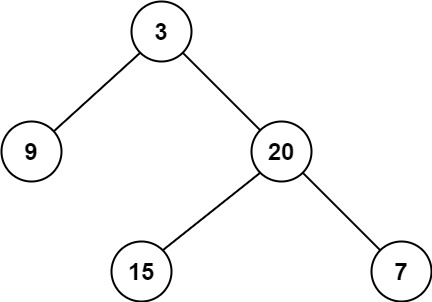[LeetCode] #111 二叉树的最小深度
给定一个二叉树,找出其最小深度。
最小深度是从根节点到最近叶子节点的最短路径上的节点数量。
说明:叶子节点是指没有子节点的节点

输入:root = [3,9,20,null,null,15,7]
输出:2
一开始以为,和[LeetCode] #104 二叉树的最大深度差不多,求最大改成求最小就行了
//错误代码
/** * Definition for a binary tree node. * public class TreeNode { * int val; * TreeNode left; * TreeNode right; * TreeNode() {} * TreeNode(int val) { this.val = val; } * TreeNode(int val, TreeNode left, TreeNode right) { * this.val = val; * this.left = left; * this.right = right; * } * } */ class Solution { public int minDepth(TreeNode root) { return root == null ? 0 : Math.min(minDepth(root.left), minDepth(root.right)) + 1; } }
提交后发现忽视了 二叉树某节点只有左节点或右节点 的特殊情况,例如[2,null,3,null,4,null,5,null,6]
所以需要单独对 特殊情况 讨论
class Solution { public int minDepth(TreeNode root) { if (root == null) return 0; if (root.left == null && root.right != null) return 1 + minDepth(root.right); if (root.right == null && root.left != null) return 1 + minDepth(root.left); return Math.min(minDepth(root.left), minDepth(root.right)) + 1; } }
迭代/层次遍历,参考[LeetCode] #104 二叉树的最大深度中的第二种解法
求最大深度时,本质是数有多少层;求最小深度时,我们需要在数多少层的过程中判断该层是否有叶子节点。
class Solution { public int minDepth(TreeNode root) { if (root == null) return 0; Queue<TreeNode> tmpQueue = new LinkedList<>(); tmpQueue.offer(root); int res = 0; while (!tmpQueue.isEmpty()) { res++; for (int i = tmpQueue.size(); i > 0;i--) { TreeNode node = tmpQueue.poll(); if (node.left == null && node.right == null) return res; if (node.left != null) tmpQueue.offer(node.left); if (node.right != null) tmpQueue.offer(node.right); } } return res; } }
知识点:无
总结:特殊情况,单独讨论


 浙公网安备 33010602011771号
浙公网安备 33010602011771号